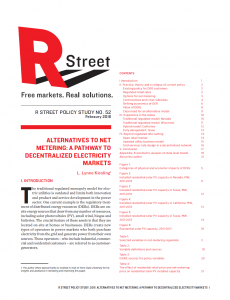Full Title: Alternatives to Net Metering: A Pathway to Decentralized Electricity Markets
Author(s): Lynne Kiesling
Publisher(s): R Street Institute
Publication Date: February 1, 2016
Full Text: Download Resource
Description (excerpt):
The traditional regulated monopoly model for electric utilities is outdated and limits both innovation and product and service development in the power sector. One current example is the regulatory treatment of distributed energy resources (DERs). DERs are onsite energy sources that draw from any number of resources, including solar photovoltaics (PV), small wind, biogas and batteries. The crucial feature of these assets is that they are located on-site at homes or businesses. DERs create new types of operators in power markets who both purchase electricity from the grid and generate power from their own sources. These operators – who include industrial, commercial and residential customers – are referred to as customer-generators.
At times, customer-generators generate more electricity from DERs than they use. In 46 states and the District of Columbia, this excess energy can be sold back to the utility, which then will make the power available to other customers through a process called net metering. Net-metering regulations have been implemented since the 1970s to encourage renewable DERs, in part because they were simple to process, given non-digital metering. As more residential customers adopt DERs and receive payments through net metering, their increasing heterogeneity is exposing the tensions of attempting to integrate them into a regulatory framework designed for large-scale central power generation. That framework makes disentangling the economic and political effects of DER costs and benefits difficult. DERs impose costs by using the distribution network when DER owners sell excess generation; they also confer benefits when they provide voltage and frequency regulation and other grid services to the network.
